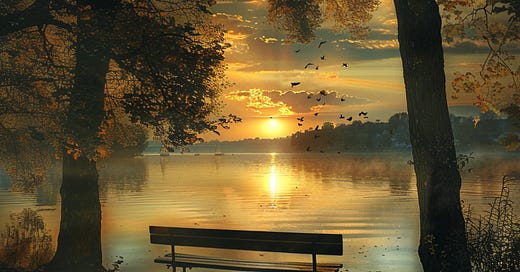I told my host I had watched the sunrise over Lake Erie, and he replied, “Yes, it’s paradise here. Not many of them left.”
His statement reminded me of times when I felt like I was living in paradise.
I felt that way when I lived in Hawaii and watched the cruise ships go by. They were visiting paradise, and I was living there.
We remember when we lived in Idaho, with its beautiful mountains, lakes, and rivers, or when we visited Vermont and its rolling hills, Colorado and its soaring mountains, or Montana with its endless sky and quiet.
They were all paradise to me.
Which raises a key question. Is paradise a location?
Can we visit it, as I was doing that day at Lake Erie? Can we reserve our spot? Are there really only a few places left that can be called paradise?
If where we live doesn’t feel like paradise, whose fault is it? Can we change the way we see it? Can we do practical things to bring it closer to our version of paradise?
I propose that paradise is not a location at all.
Let’s start with my host, who believes he lives in paradise. It is for him. He planned it that way. He chooses to make it so. He finds happiness in making his retirement full by providing a B&B for visitors.
What if he hated living in a small town by the lake? A town that is so cold in the winter that most people can’t stay and need a second home elsewhere—presumably not paradise? What if he felt trapped by circumstances?
With that point of view and state of mind, it wouldn’t matter how beautiful the place is. It wouldn’t be paradise for him.
It’s a great way to not live in paradise—hate where you live.
The reverse is also true.
We could live anywhere and, if we chose it, make it beautiful in our eyes. If we choose the point of view and state of mind that it is paradise for us, it could be.
The definition of paradise gives the jig away: "…a beautiful, pleasant, or peaceful place that seems to be perfect, a place that is perfect for a particular activity or person who enjoys that activity, a state of complete happiness, a place or state of bliss, felicity, or delight, heaven.”
This means that paradise is open to anyone at any time.
However, we aren’t trained that way. We are trained for a future paradise, or a paradise available to only a lucky few.
It’s a great way to not live in paradise. Not realize that it only takes a shift of perception to experience it.
Did you follow the boys who climbed Mount Everest without oxygen? They were in their paradise. For most of us, it would be a horrible place. It was harsh yet beautiful for Adrian and Cory. What made it paradise for them was their point of view and state of mind.
We don’t have to go to such great heights to find our paradise.
We can start with where we are right now.
Check out the nearest tree, flower, or piece of art. Or, look around your room right now and find something that is beautiful in its own way. For a moment, make it your whole world.
Find a way to make where you are in this moment a paradise.
That way, your thinking will already be living there.
So, even if the location you find yourself in isn’t the perfect paradise for you, the universe can easily switch to one that more closely matches your desires.
Remember, it doesn’t matter where we live. It won't be paradise if we don’t have a paradise point of view and state of mind.
And it doesn’t matter where we live if we have a paradise point of view and state of mind because it will be.






So true! Many think living here in Hawaii is paradise, but paradise is truly a state of mind.